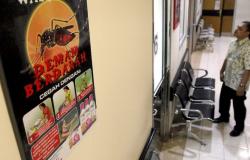A consortium led by Caroline Klaver of Radboud university medical center will develop new treatments against blindness. The researchers want to repair broken genes, print a new retina with a bio-printer, and find out how zebrafish manage to repair their own retinas. The consortium will receive 22 million euros for this from the NWO Gravitation program of the Ministry of Education, Culture and Science.
Blindness can arise in different ways. In young people, a hereditary retinal disease is the main cause, for the elderly it is age-related macular degeneration. The Ministry of Education, Culture and Science is now investing 22 million euros in the project Lifelong Visionin which researchers will develop new therapies that can be used for various forms of blindness.
An important part of the project is gene therapy. If an error in a gene leads to blindness, doctors can already introduce a completely new gene. They inject it under the retina into the eye, in the hope that it reaches the right cells and ensures that those cells start making healthy proteins again. “Unfortunately, this does not work very well yet,” says Professor of Epidemiology and Genetics of Eye Diseases Caroline Klaver of Radboud university medical center. ‘Many genes are not suitable for this because they are too large. We therefore want to carry out the repair much more precisely, with gene editing. We only rewrite the error in the gene, and therefore no longer replace the entire gene.’
Zebrafish
The researchers are also looking at how they can protect cells in the eye. It has already been extensively mapped out why a cell in an eye with a genetic defect dies. This offers starting points for keeping cells alive, for example with a special cocktail of proteins that help the cells with this. And the strategy of zebrafish is also very interesting: they can repair their retina themselves, something that humans cannot do. The researchers want to see how zebrafish do this and find out whether this can also be introduced to humans.
The researchers will also develop cell therapy. ‘The retina is brain tissue. It is a complex tissue of up to ten different layers, in which the nerve cells all interact with each other,’ says Klaver. ‘We previously tried to repair damaged retina by injecting stem cells, but that did not work well. We are now going to see if we can make a retina with a bio-printer that places the different cell layers on top of each other. And we are finding out how that printed retina can connect to the choroid. This is very new and wonderful research.’
Finally, the project is developing AI that can determine who is eligible for these treatments. This means the right patient receives the right treatment at the right time.
Consortium
On the project Lifelong Vision eight research institutions are participating. The project is led by Caroline Klaver of Radboud university medical center. Other main researchers are Rob Collin and Ronald Roepman from Radboud university medical center, and Camiel Boon, Arthur Bergen and Clarisa Sánchez from Amsterdam UMC.
Gravitation: Research of top international level
The Gravitation program is carried out by NWO on behalf of the Ministry of Education, Culture and Science. The seven consortia selected this year will together receive 160.5 million euros. Researchers can conduct top research and collaborate multidisciplinary for ten years. Minister Robbert Dijkgraaf (OCW): ‘With investments like these we ensure that we remain among the scientific world leaders in the Netherlands. This not only provides important new insights, but also strengthens the strength of our economy. And it brings innovations that benefit us all. I am proud that we have such scientific talent in our own country. That is not self-evident. Really something to cherish.’
Project leader Caroline Klaver
Tags: NWO Gravitation grant development therapies blindness Consortium led Caroline Klaver receives million euros
-






